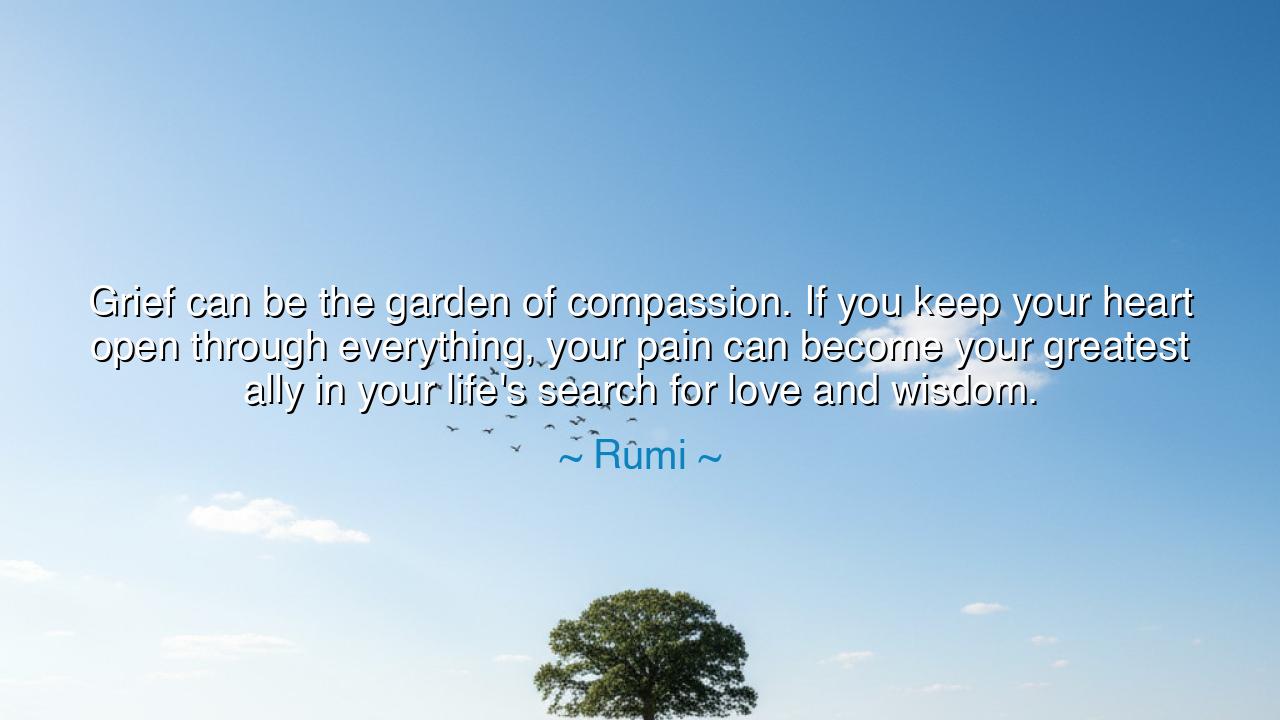
Grief can be the garden of compassion. If you keep your heart
Grief can be the garden of compassion. If you keep your heart open through everything, your pain can become your greatest ally in your life's search for love and wisdom.






In the eternal poetry of the heart, Jalal ad-Din Rumi, the mystic of love and light, once wrote: “Grief can be the garden of compassion. If you keep your heart open through everything, your pain can become your greatest ally in your life's search for love and wisdom.” These words, radiant with divine truth, speak of the sacred alchemy of the soul — how sorrow, when embraced rather than resisted, transforms into understanding and grace. Rumi, who himself walked through the fires of loss, knew that grief is not a punishment, but a teacher, and that through the wounds of the heart, light can enter and bloom into compassion.
The origin of this wisdom lies in Rumi’s own life, for his poetry was born from love and loss. When his beloved friend and spiritual companion, Shams of Tabriz, vanished — some say slain, others say exiled — Rumi’s heart broke open. The pain was unbearable, yet he did not let it harden him; he let it transform him. In his grief, he began to spin and sing, birthing the verses that would heal not only his own soul but countless others for centuries to come. Out of that sorrow grew the Mevlevi order, the whirling dervishes, who turn in circles of remembrance — symbolizing that what seems like destruction can become dance, that pain, if embraced with love, becomes movement toward God.
“Grief can be the garden of compassion,” says Rumi — and indeed, the garden is the perfect image. For just as flowers require both sunlight and rain, the soul must know both joy and sorrow to truly grow. In grief, the soil of the heart is broken open, made tender, receptive. Tears, like rain, soften the earth, allowing the seeds of empathy to sprout. The one who has suffered deeply can understand the suffering of others; the one who has known darkness can better guide others toward light. Thus, compassion is not learned from comfort, but from the sacred ache that connects us all as human beings.
Consider the story of Nelson Mandela, who spent twenty-seven years in prison, deprived of freedom and family. Many would have emerged bitter, yet Mandela emerged radiant with forgiveness. His grief became his garden. Instead of allowing pain to harden his heart, he let it deepen it. He used his sorrow as a mirror to understand the pain of his people — and through that understanding, he led them with compassion, not vengeance. Like Rumi, he turned his suffering into strength, and his strength into love. His life stands as a living echo of Rumi’s truth: that when pain is embraced with openness, it becomes a path to wisdom.
But Rumi also offers a warning — “If you keep your heart open through everything.” For the heart’s first instinct, when wounded, is to close, to protect itself from further harm. Yet a closed heart cannot heal; it becomes a stone, incapable of love or growth. To keep the heart open in grief is an act of courage — the highest form of spiritual bravery. It is to say: I will not let this pain destroy my capacity to love. The one who can remain open through sorrow does not become smaller through loss — they become vaster, like an ocean that can hold both storms and calm within itself.
In truth, pain is not our enemy but our ally. It strips away illusion and pride; it teaches humility, patience, and the preciousness of each fleeting joy. It reminds us that life is not meant to be mastered, but to be felt. When pain is accepted as a companion rather than resisted as a foe, it becomes a guide — one that leads us toward love and wisdom, as Rumi says. The wise do not seek to escape pain, but to listen to it, to let it carve them into vessels capable of holding more light.
Thus, the lesson of Rumi’s words is clear: Do not flee from grief — walk with it. When sorrow visits you, welcome it as a teacher. Let your tears water the garden of your soul, for out of that soil, compassion will bloom. Open your heart, though it trembles, and let the pain teach you tenderness. Every loss, every wound, carries within it a seed of awakening — if only you dare to nurture it.
So remember, dear listener: life will break you open, but it breaks you open so that you may feel more deeply, love more fully, and understand more truly. This is the sacred work of being human — to turn suffering into wisdom, and pain into compassion. And as Rumi whispers through the ages: Your grief is your garden. Tend it with an open heart, and it will one day blossom into love.






AAdministratorAdministrator
Welcome, honored guests. Please leave a comment, we will respond soon